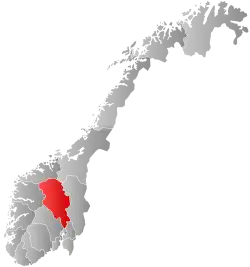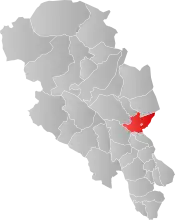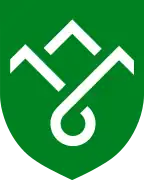Fåberg
Fåberg is a former municipality in the old Oppland county, Norway. The 478-square-kilometre (185 sq mi) municipality existed from 1838 until 1964. Now, it is part of Lillehammer Municipality in Innlandet county. The administrative centre was the village of Fåberg.[1]
Fåberg herred
Faaberg herred (historic) | |
|---|---|
 View of Faaberg | |
 Oppland within Norway | |
 Fåberg within Oppland | |
| Coordinates: 61°10′06″N 10°24′17″E | |
| Country | Norway |
| County | Oppland |
| District | Gudbrandsdal |
| Established | 1 Jan 1838 |
| • Created as | Formannskapsdistrikt |
| Disestablished | 1 Jan 1964 |
| • Succeeded by | Lillehammer Municipality |
| Administrative centre | Fåberg |
| Area (upon dissolution) | |
| • Total | 478 km2 (185 sq mi) |
| Population (1964) | |
| • Total | 13,381 |
| • Density | 28/km2 (73/sq mi) |
| Time zone | UTC+01:00 (CET) |
| • Summer (DST) | UTC+02:00 (CEST) |
| ISO 3166 code | NO-0524 |
History
The prestegjeld of Faaberg (later spelled Fåberg) was established as a municipality on 1 January 1838 (see formannskapsdistrikt law). On 1 January 1906, a part of Faaberg (population: 140) that was adjacent to the town of Lillehammer was transferred from Faaberg to the town of Lillehammer. During the 1960s, there were many municipal mergers across Norway due to the work of the Schei Committee. On 1 January 1964, Fåberg Municipality (population: 13,381) was merged with the town of Lillehammer (population: 5,905) to form a new Lillehammer Municipality.[2]
Name
The municipality (originally the parish) is named after the old Faaberg farm (Old Norse: Fágaberg) since the first Fåberg Church was built there. The meaning of the first element is uncertain, but it may come from the word fága which means "to clean" or "to polish". The last element is berg which means "mountain" or "rock". Prior to the 1917 Norwegian language reform law, the name was spelled with the digraph "aa" (Faaberg), and after this reform, the letter å was used instead (Fåberg).[3]
Government
While it existed, this municipality was responsible for primary education (through 10th grade), outpatient health services, senior citizen services, unemployment, social services, zoning, economic development, and municipal roads. During its existence, this municipality was governed by a municipal council of directly elected representatives. The mayor was indirectly elected by a vote of the municipal council.[4]
Municipal council
The municipal council (Herredsstyre) of Fåberg was made up of representatives that were elected to four year terms. The party breakdown of the final municipal council was as follows:
| Party Name (in Norwegian) | Number of representatives | |
|---|---|---|
| Labour Party (Arbeiderpartiet) | 19 | |
| Conservative Party (Høyre) | 5 | |
| Communist Party (Kommunistiske Parti) | 1 | |
| Christian Democratic Party (Kristelig Folkeparti) | 2 | |
| Centre Party (Senterpartiet) | 6 | |
| Liberal Party (Venstre) | 2 | |
| Total number of members: | 35 | |
| Note: On 1 January 1964, Fåberg became part of Lillehammer Municipality. | ||
| Party Name (in Norwegian) | Number of representatives | |
|---|---|---|
| Labour Party (Arbeiderpartiet) | 20 | |
| Conservative Party (Høyre) | 4 | |
| Communist Party (Kommunistiske Parti) | 1 | |
| Christian Democratic Party (Kristelig Folkeparti) | 2 | |
| Farmers' Party (Bondepartiet) | 6 | |
| Liberal Party (Venstre) | 2 | |
| Total number of members: | 35 | |
| Party Name (in Norwegian) | Number of representatives | |
|---|---|---|
| Labour Party (Arbeiderpartiet) | 13 | |
| Conservative Party (Høyre) | 2 | |
| Communist Party (Kommunistiske Parti) | 1 | |
| Christian Democratic Party (Kristelig Folkeparti) | 1 | |
| Farmers' Party (Bondepartiet) | 5 | |
| Liberal Party (Venstre) | 2 | |
| Total number of members: | 24 | |
| Party Name (in Norwegian) | Number of representatives | |
|---|---|---|
| Labour Party (Arbeiderpartiet) | 13 | |
| Communist Party (Kommunistiske Parti) | 1 | |
| Christian Democratic Party (Kristelig Folkeparti) | 1 | |
| Farmers' Party (Bondepartiet) | 5 | |
| Joint list of the Liberal Party (Venstre) and the Radical People's Party (Radikale Folkepartiet) | 3 | |
| Joint List(s) of Non-Socialist Parties (Borgerlige Felleslister) | 1 | |
| Total number of members: | 24 | |
| Party Name (in Norwegian) | Number of representatives | |
|---|---|---|
| Labour Party (Arbeiderpartiet) | 13 | |
| Communist Party (Kommunistiske Parti) | 1 | |
| Christian Democratic Party (Kristelig Folkeparti) | 1 | |
| Farmers' Party (Bondepartiet) | 6 | |
| Joint list of the Liberal Party (Venstre) and the Radical People's Party (Radikale Folkepartiet) | 3 | |
| Total number of members: | 24 | |
| Party Name (in Norwegian) | Number of representatives | |
|---|---|---|
| Labour Party (Arbeiderpartiet) | 12 | |
| Farmers' Party (Bondepartiet) | 8 | |
| Joint list of the Conservative Party (Høyre) and the Free-minded People's Party (Frisinnede Folkeparti) | 1 | |
| Joint list of the Liberal Party (Venstre) and the Radical People's Party (Radikale Folkepartiet) | 3 | |
| Total number of members: | 24 | |
| Note: Due to the German occupation of Norway during World War II, no elections were held for new municipal councils until after the war ended in 1945. | ||
Mayors
The mayors of Fåberg (incomplete list):[11][12]
- 1846-1847: Rasmus Lyng
- 1848-1849: G. Fliflet
- 1856-1859: Hans A. Jørstad
- 1860-1867: Christian A. Rindal[13]
- 1868-1879: Bernt Dahl[14]
- 1880-1883: Christian A. Rindal[13]
- 1884-1891: Bernt Dahl
- 1892-1897: Simen Tollersrud[15]
- 1898-1901: Thorstein Rustad
- 1902-1907: Karl Lundgaard[16]
- 1908-1910: Johannes Skaug
- 1911-1913: Karl Lundgaard
- 1914-1922: Peder Aslak Owren (ArbDem)
- 1923-1925: Per Tollersrud (Bp)
- 1926-1928: Peder Aslak Owren (ArbDem)
- 1929–1931: Nils Christiansen
- 1932–1934: Per Tollersrud (Bp)
- 1935–1937: Nils Christiansen
- 1937–1940: Carl Haugen (Ap)
- 1941-1945: Nils Christiansen (NS)
- 1945–1957: Oskar Skogly (Ap)
- 1958-1960: Ola Jensvold[17]
- 1961-1963: Magne Henriksen (Ap)
Notable people
Notable people that were born or lived in Fåberg include:
- Carl Sofus Lumholtz (1851–1922), an explorer, ethnographer, and archaeologist
- Kalle Løchen (1865–1893), a painter and actor
- Lars Olsen Skrefsrud (1840–1910), a missionary and language researcher in India
References
- Helland, Amund (1913). "Faaberg herred". Norges land og folk: Kristians amt (in Norwegian). Vol. V. Kristiania, Norway: H. Aschehoug & Company. p. 536. Retrieved 3 July 2022.
- Jukvam, Dag (1999). "Historisk oversikt over endringer i kommune- og fylkesinndelingen" (PDF) (in Norwegian). Statistisk sentralbyrå. ISBN 9788253746845.
- Thorsnæs, Geir, ed. (29 March 2022). "Fåberg". Store norske leksikon (in Norwegian). Kunnskapsforlaget. Retrieved 3 July 2022.
- Hansen, Tore; Vabo, Signy Irene, eds. (20 September 2022). "kommunestyre". Store norske leksikon (in Norwegian). Kunnskapsforlaget. Retrieved 1 January 2023.
- "Kommunevalgene og Ordførervalgene 1959" (PDF) (in Norwegian). Oslo, Norge: Statistisk sentralbyrå. 1960.
- "Kommunevalgene og Ordførervalgene 1955" (PDF) (in Norwegian). Oslo, Norge: Statistisk sentralbyrå. 1957.
- "Kommunevalgene og Ordførervalgene 1951" (PDF) (in Norwegian). Oslo: Statistisk sentralbyrå. 1952.
- "Kommunevalgene og Ordførervalgene 1947" (PDF) (in Norwegian). Oslo: Statistisk sentralbyrå. 1948.
- "Kommunevalgene og Ordførervalgene 1945" (PDF) (in Norwegian). Oslo: Statistisk sentralbyrå. 1947.
- "Kommunevalgene og Ordførervalgene 1937" (PDF) (in Norwegian). Oslo: Statistisk sentralbyrå. 1938.
- Bjørnhaug, Inger (2000). "Dølaby, verdensby". Lillehammer og Fåbergs historie (in Norwegian). Vol. 3. ISBN 82-7847-059-6.
- "Ordførere i Fåberg". DigitalMuseum.no (in Norwegian). Retrieved 7 May 2023.
- "Ordførervalg". Hamar Stiftstidende (in Norwegian). 7 January 1882. p. 3.
- "Ordfører". Oplandenes Avis (in Norwegian). 24 March 1877. p. 1.
- "Til ordfører i Faaberg". Framgang (in Norwegian). 31 December 1895. p. 2.
- "Ordfører". Gjøviks Blad (in Norwegian). 7 January 1902. p. 1.
- "Ordfører". Gudbrandsdølen (in Norwegian). 26 November 1957. p. 2.

